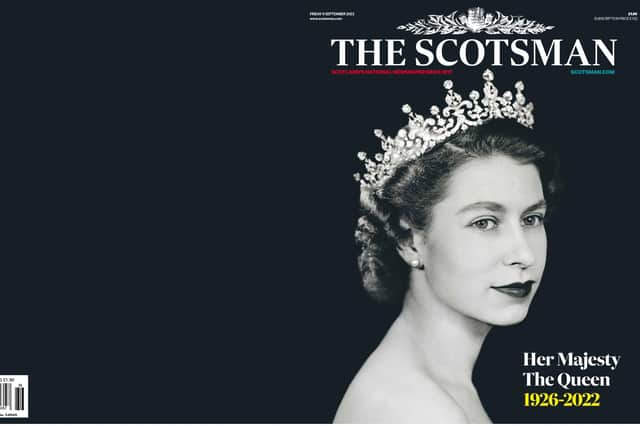A nation’s profound loss and sadness


Our deepest condolences and prayers are with King Charles III, and the whole Royal family today, after the death of the Queen at Balmoral.
Before all else, above all else, they must be allowed to mourn the passing of a mother, grandmother and great grandmother who lived a life that was remarkable, by any measure.
Advertisement
Hide AdAdvertisement
Hide AdFor them, the natural, wrenching loss of a close family member - familiar to anyone of any age - will be no less diminished by the fullness of the Queen's life, or her reign.
For the rest of us, the loss will also be keenly felt, if in different ways.
The Queen was a constant presence in nearly all our lives: as Prime Minister Liz Truss observed yesterday, "Her life of service stretched beyond most of our living memories".
It was not only the length of the Queen's service, but its constancy in a rapidly changing world, that meant so much.
She became Queen in postwar Britain, but her reign would stretch through the swinging sixties, transformations in human rights in the UK, the Commonwealth and across the world, Thatcher's 80s, the Falklands War, the end of apartheid, Britpop, New Labour, the digital revolution and the struggle against Islamic terror.
Through recessions and booms, wars and periods of relative peace, of globalisation and the interconnection of her once far-flung Commonwealth.
Across so much tumult, her precisely-chosen words often reflected carefully-calibrated shifts towards progress and the future.
But often the Queen's views on party political matters were rarely, if ever, stated, or indicated so subtly as to be almost imperceptible.
Advertisement
Hide AdAdvertisement
Hide AdOnly rarely did that impeccable facade appear to slip: she was reported to have been against Scottish Independence in the run up to the 2014 referendum.
That appeared to be confirmed after David Cameron's gauche claim, following the result, that the Queen "purred down the line" when he phoned to tell her Scotland had voted no to independence.
Even he later admitted his indiscretion had been "a terrible mistake".
Yesterday, the Archbishop of Canterbury, Justin Welby, best captured the Queen's role among the long list of public figures wishing to pay tribute.
"As we grieve together, we know that, in losing our beloved Queen, we have lost the person whose steadfast loyalty, service and humility has helped us make sense of who we are through decades of extraordinary change in our world, nation and society," he said.
"As we sustain one another in the face of this challenge, our shared grieving will also be a work of shared re-imagining.
"I pray that we commence this journey with a sense of Her late Majesty's faith and confidence in the future.
"Her clarity of thinking, capacity for careful listening, inquiring mind, humour, remarkable memory and extraordinary kindness invariably left me conscious of the blessing that she has been to us all."
Advertisement
Hide AdAdvertisement
Hide AdThose were words worthy of Her Majesty herself. Yet, elsewhere, simple tributes also cut through as the news sank in.
Online, in a digital world that came into being entirely in the Queen's adult lifetime, actor Robert Lindsay asked simply: "Why oh why do I feel I’ve lost my parents again?"
That sentiment - of profound loss and sadness - will be gripping many this morning.
Millions will, undoubtedly, take to the streets in the days ahead to express that sadness together. We all understand Britain lost more than its Queen yesterday.
But it may take many more years to understand all that passed with the end of the second Elizabethan age.
God save the King.
Comments
Want to join the conversation? Please or to comment on this article.